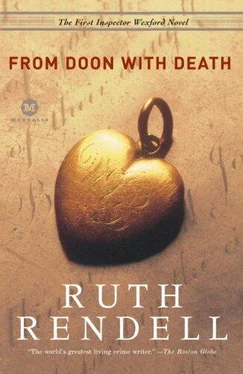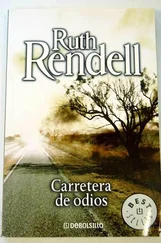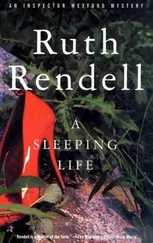‘You’d better go into the library.’ Quadrant showed him into a room furnished with blue leather chairs. ‘I won’t offer you a drink since you’re on duty’.
The words were a little offensive. Then Quadrant gave his quick cat-like smile. ‘Excuse me,’ he said, ‘while I fetch my wife.’ He turned with the slow graceful movement of a dance measure, paused briefly and closed the door behind him, shutting Wexford in.
So he wasn’t going to let him bust in on any family party, Wexford thought. The man was nervous, hiding some nebulous fear in the manner of men of his kind, under a massive self-control.
As he waited he looked about him at the books. There were hundreds here, tier upon tier of them on every wall. Plenty of Victorian poetry and plenty of Victorian novels, but just as much verse from the seventeenth and eighteenth centuries. Wexford shrugged. Kingsmarkham was surrounded by such houses as this one, a bastion of affluence, houses with libraries, libraries with books…
Fabia Quadrant came in almost soundlessly. Her long dress was black and he remembered that black was not a colour but just a total absorption of light. Her face was gay, a little hectic, and she greeted him cheerfully.
‘Hallo again, Chief Inspector.’
‘I won’t keep you long, Mrs Quadrant.’
‘Won’t you sit down?’
‘Thank you. Just for a moment’ He watched her sit down and fold her hands in her lap. The diamond on her left hand burned in the dark nest between her knees. ‘I want you to tell me everything you can remember about Dudley Drury,’ he said.
‘Well, it was my last term at school,’ she said. ‘Margaret told me she’d got a boy friend - her first, perhaps. I don’t know. It's only twelve years ago, Chief Inspector, but we weren’t like the adolescents of today. It wasn’t remarkable to be without a boy friend at eighteen. Do you understand?’ She spoke clearly and slowly, as if she were instructing a child. Something about her manner angered Wexford and he wondered if she had ever had to hurry in her life, ever had to snatch a meal standing up or run to catch a train. It was a little unusual, perhaps, but not odd, not remarkable. Margaret didn’t introduce me to her friend but I remember his name because it was like Drury Lane and I had never heard it before as a surname.’
Wexford tried to crush his impatience.
‘What did she tell you about him, Mrs Quadrant?’
‘Very little.’
She paused and looked at him as if she was anxious not to betray a man in danger. There was only one thing. She said he was jealous, jealous to the point of fanaticism.’
‘I see.’
‘He didn’t care for her to have any other friends. I had the impression that he was very emotional and possessive.’
Traits you would hardly understand, Wexford thought, or would you? He remembered Quadrant’s inconstancies and wondered again. Her voice, uncharacteristically sharp and censorious, interrupted his reverie.
‘He was very upset that she was moving back to London. She said he was in a terrible state, his life wouldn’t be worth living without her. You can imagine the sort of thing.’
‘But he’d only known her a few weeks.’
‘I’m simply telling you what she said, Chief Inspector.’ She smiled as if she was an immense distance from Drury and Margaret Godfrey, light years, an infinity of space. ‘She didn’t seem to care. Margaret wasn’t a sensitive person.’
Soft footsteps sounded in the hall and behind Wexford the door opened.
‘Oh, there you are,’ Fabia Quadrant said. ‘Chief Inspector Wexford and I have been talking about young love. It all seems to me rather like the expense of spirit in a waste of shame.’
But that wasn’t young love, Wexford thought, trying to place the quotation. It was much more like what he had seen on Helen Missal’s face that afternoon.
Just one small point, Mrs Quadrant,’ he said. ‘Mrs Parsons seems to have been interested in Victorian poetry during the two years she lived in Flagford. I’ve wondered if there was any special significance behind that.’
‘Nothing sinister, if that’s what you mean,’ she said. ‘Nineteenth century verse was part of the Advanced English syllabus for Higher School Certificate when we took it in 1951. I believe they call it “A” Levels now.’
Then Quadrant did a strange thing. Crossing the library between Wexford and his wife, he took a book out of the shelves. He put his hand on it without hesitation. Wexford had the impression he could have picked it out blindfold or in the dark.
‘Oh, Douglas,’ Mrs Quadrant said, ‘he doesn’t want to see that.’
‘Look.’
Wexford looked and read from an ornate label that had been pasted inside the cover:
Presented to Fabia Rogers for distinguished results in Higher School Certificate, 1951.
In his job it didn’t do to be at a loss for words, but now he could find no phrase to foster the pride on Quadrant’s dark face, or mitigate the embarrassment on his wife’s.
‘I’ll be going now,’ he said at last.
Quadrant put the book back abruptly and took his wife’s arm. She rested her fingers firmly on his jacket sleeve. Suddenly they seemed very close, but, for all that, it was a strangely sexless communion. Brother and sister, Wexford thought, a Ptolemy and a Cleopatra.
‘Good night, Mrs Quadrant. You’ve been most cooperative. I apologize for troubling you…’ He looked again at his watch. ‘At this hour,’ he said, savouring Quadrant’s enmity.
‘No trouble. Chief Inspector.’ She laughed deprecatingly, confidently, as if she was really a happy wife with a devoted husband.
Together they showed him out Quadrant was urbane, once more courteous, but the hand beneath the sleeve where his wife’s fingers lay was clenched and the knuckles showed like white flints under the brown skin.
A bicycle was propped against the police-station wall, a bicycle with a basket, practical-looking lights and a bulging tool bag. Wexford walked into the foyer and almost collided with a fat fair woman wearing a leather windcheater over a dirndl skirt. ‘I beg your pardon.’
“That’s all right,’ she said. ‘No bones broken. I suppose you wouldn’t be him, this Chief Inspector bod?’
Behind the desk the sergeant grinned slightly, changed the grin to a cough, and covered his mouth with his hand.
‘I am Chief Inspector Wexford. Can I help you?’
She fished something out of her shoulder bag.
‘Actually,’ she said, ‘I’m supposed to be helping you. One of your blokes came to my cottage…’
‘Miss Clarke,’ Wexford said. ‘Won’t you come into my office?’
His hopes had suddenly risen unaccountably. It made a change for someone to come to him. Then they fell again when he saw what she had in her hand. It was only another photograph.
‘I found it,’ she said, ‘among a lot of other junk. If you’re sort of scouring the joint for people who knew Margaret it might help.’
The picture was an enlarged snapshot. It showed a dozen girls disposed in two rows and it was obviously not an official photograph.
‘Di took it,’ Miss Clarke said. ‘Di Stevens that was. Best part of the sixth form are there.’ She looked at him and made a face as if she was afraid that by bringing it she had done something silly. ‘You can keep it if it’s any use.’
Wexford put it in his pocket, intending to look at it later, although he doubted whether it would be needed now. As he was showing Miss Clarke out he met Sergeant Martin coming back from his interview with the manager of the supermarket. No records had been kept of the number of pink hoods sold during the week, only the total sale of hoods in all colours. The stock had come in on Monday and Saturday night twenty-six hoods had been sold. The manager thought that about twenty-five per cent of the stock had been pink and on a very rough estimate he guessed that about six pink ones had been sold.
Читать дальше











